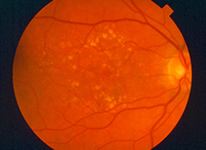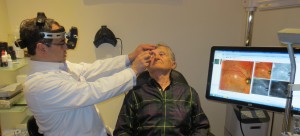Macular Degeneration
Macular degeneration, also known as age-related macular degeneration (AMD) is a common condition in older adults and the leading cause of vision loss in people over the age of 50. Macular degeneration affects the macula, the part of the retina responsible for the crisp, detailed central vision needed for reading or driving. As we age, the tissue in the eye responsible for vision slowly begins to deteriorate which can significantly affect a patient's quality of life.
Types of Age-Related Macular Degeneration

Dry AMD
Macular degeneration can be classified as either dry (non-neovascular) or wet (neovascular). Dry macular degeneration is the more common diagnosis, and is considered to be an early stage of the disease. This form of the disease usually develops as a result of aging and thinning of macular tissues and the depositing of pigment within the macula.
Only about 10 percent of patients see their condition progress to the more advanced and damaging wet macular degeneration. In wet macular degeneration, new blood vessels develop beneath the macula and cause a leakage of blood and fluid. This leakage can lead to permanent damages in the central vision and the creation of blind spots.
Symptoms of Age-Related Macular Degeneration
Patients with dry macular degeneration may notice gradual changes to their vision, including shadowy areas in the central vision, or fuzzy and distorted vision. These areas grow larger as the disease progresses, and can eventually turn into blind spots. Patients may also have difficulty seeing color and fine details.
If the disease progresses to the wet form, patients may also see straight lines as wavy. With wet macular degeneration, central vision loss can occur rapidly, sometimes in as little as a few days or weeks.
Your doctor may be able to detect early signs of macular degeneration, before any symptoms occur, through a regular eye exam. Any signs of this condition can be further confirmed by testing your central vision with an Amsler grid test. Regular eye exams are important in detecting macular degeneration and other serious eye conditions as early as possible, so that permanent side effects can be avoided.
Causes and Risk Factors of Age-Related Macular Degeneration
Many cases of macular degeneration are a result of aging and the natural deterioration of the eye tissue that is needed for clear vision. This disease can also be related to a genetic factor in patients who have a gene variant known as complement factor H. Nearly half of the cases of blindness, associated with macular degeneration, are linked to this genetic deficiency.
Macular degeneration is most common in females and whites, and the risk for all patients increases with age. This condition is the leading cause of blindness in the United States for patients over the age of 50. Over 30 percent of adults over the age of 75 have been diagnosed with advanced or intermediate age-related macular degeneration.
Other factors that may increase your risk of developing macular degeneration include:
- Obesity
- Smoking
- Heredity
- Age
- High fat diet
- Caucasian Race
- Elevated cholesterol levels
- Prolonged sun exposure
- High blood pressure
- Lighter eye color
- Side effects of certain drugs
Patients can minimize their risk of macular degeneration by practicing a healthy, active lifestyle and getting regular eye exams. It is important for all patients to exercise regularly, avoid smoking, and eating a balanced diet that includes foods known to preserve vision and prevent eye diseases.
Diagnostic Testing for Age-Related Macular Degeneration
After a thorough medical examination of the eyes, some of the following diagnostic tests will be conducted to confirm diagnosis:
- Visual acuity test
- Dilated eye examination
- Tonometry test
- Retinal exam
- Fluorescein/Indocyanine Green angiography
- Optical Coherence Tomography
Treatment of Age-Related Macular Degeneration
 While there is no cure for macular degeneration, there are several treatment options available to help patients manage this condition and preserve their vision. The best treatment option for each patient depends on the severity and type of the condition, as well as how much, if any, permanent vision loss has occurred.
While there is no cure for macular degeneration, there are several treatment options available to help patients manage this condition and preserve their vision. The best treatment option for each patient depends on the severity and type of the condition, as well as how much, if any, permanent vision loss has occurred.
Intraocular injections of vascular endothelial growth factor medicines (Avastin, Lucentis, Eylea) are often successful in stopping abnormal blood vessel growth in wet macular degeneration. The medications are injected into the vitreous of the eye on a regular basis to control the damaging effects of wet macular degeneration. Photodynamic therapy may also be useful in some cases by removing newly developing abnormal blood vessels that are characteristic of wet macular degeneration. Many patients also benefit from vitamin and mineral supplements, which can clear out toxic substances that may build up in advanced cases of this condition.
It is essential for patients with macular degeneration, wet or dry, to seek continuous medical treatment to manage their condition and prevent permanent vision loss from occurring. Our practice has extensive experience in the treatment of these conditions, and can offer patients the latest, most advanced treatments to help preserve vision and the overall quality of life. To learn more about our services, call us today to schedule an appointment.

